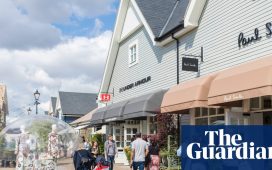Amil Mostafa feels he is fighting a losing battle. “Someone tries at least three times a day,” the Mountain Warehouse supervisor said of attempts to steal merchandise from the branch of the outdoor retailer where he works.
“Recently, a guy ran in and grabbed six jackets, worth about £290, £300 each, and I had to chase him out of the shop,” said Mostafa, describing how the shoplifter’s friend had stood by the door of the shop in London’s north Islington to try to block his attempt to give chase.
Mostafa and his employer are not the only ones feeling the heat. Although supermarkets are among the most frequent victims of shoplifting, other sectors such as clothing and luxury goods are increasingly being targeted. Retailers including Primark and John Lewis have recently warned they are taking a painful financial hit from crime, while US retailers have also described a surge in theft.
This week, a coalition of the UK’s largest retail associations, including the British Retail Consortium and the Association of Convenience Stores, sent a letter to every police and crime commissioner in England and Wales decrying a level of shoplifting that they said was having an enormous financial impact on businesses.
“Retailers are facing unprecedented levels of shop theft in their stores, with many now seeing organised looting of their businesses on a regular basis,” they said.

Fast-fashion chain Primark became the first to lay bare the impact in an earnings call this month. The retailer disclosed that theft was the main reason for a 50 basis point hit to margins so far in 2023.
George Weston, chief executive of parent group Associated British Foods, told analysts that this would probably fall to about 8 per cent in the second half of the year, below previous guidance of about 8.3 per cent, saying theft and staff abuse was “worse than we’ve seen in the past and it continues to get worse”.
Soon after, John Lewis revealed that it had suffered a £12mn year-on-year increase in stock “shrinkage”, most of which was because of shoplifting. Dame Sharon White, chair of John Lewis, blamed a large part of the increase on a rise in organised crime and “shoplifting to order”, with repeat offenders now coordinating hits on multiple stores in succession.
Next has also said that its margins have been hit by shoplifting in the first half of this year. “We’re definitely seeing an uptick,” said chief executive Lord Simon Wolfson. “It probably eroded margins by 0.2 per cent in the first half.”
It is a similar picture elsewhere: in the US, Target said that “shrink” would cut its profits this year by $500mn more than in 2022. Home Depot, Dollar Tree and Foot Locker have also warned that crime will hurt profitability.

Despite evidence on the shop floor pointing to a sharp rise in theft, the actual overall level of shoplifting and whether it is increasing to record levels is debated.
Shoplifting offences in the year to the end of March were up 24 per cent year on year according to police data — because of the distorting effect of store closures during the Covid-19 pandemic — but were still below pre-Covid rates. The 342,000 shoplifting offences recorded in the 12 months to March compares with 375,00 recorded in the year ending March 2019.
Yet the Association of Convenience Stores, which represents more than 30,000 local shops, told the Financial Times that shoplifting in its sector had risen to a level it had never seen before. It argued that the discrepancy between the experience of retailers and official statistics was because of a lack of crimes against business — only 16 per cent, by its estimation — being reported.
“We know that the amount of theft that ends up getting reported and recorded is minuscule compared to what actually happens,” said ACS chief executive James Lowman.
A study published by the British Retail Consortium this year, covering the period from April 1 2021 to March 31 2022, came to the same conclusion. It reported that theft by customers was higher than pre-Covid levels with about 8mn incidents costing retailers £953mn in lost stock.
Retail organisations claim that staff see little point in reporting theft and other types of crime to the police because when they have done it has often been met with inaction.
“With the police, it’s a lost cause . . . we have a policy of always reporting [thefts] but nothing ever happens,” said Mostafa at Mountain Warehouse.
This inaction, retailers and workers say, also drives crime because shoplifters believe they will suffer no consequences. Some pointed out that a theft worth under £200 is treated as a summary offence, meaning it is punishable by nothing more than a £70 fine and no requirement to attend court.
“People are getting very brave because of the non-prosecution rules; they can take a small amount like £30 worth of stuff and then come back later for more,” said Yasir Gulzar, a manager at Japanese chain Muji’s branch in London’s Oxford Street.
He said the outlet did not report thefts now unless they hit the £400 to £500 mark, adding that he had known instances of people working in twos or threes brazenly sweeping up “whole piles” of items.
The National Police Chiefs’ Council said it was “doing everything possible to tackle offenders and support retailers”.
Chief Constable Amanda Blakeman, its lead for acquisitive crime, said: “Police forces take any incident of violence incredibly seriously, and will prioritise our response where there is a risk to individuals.” She added that police forces “will continue to work closely with them [retail workers], listen to their concerns and act appropriately”.

Retailers have blamed the rise on several factors. Primark and John Lewis have highlighted a rise in organised crime, whilst acknowledging that the cost of living squeeze has pushed more people to the brink, especially when it comes to food and other essentials.
However, the sector has pushed back against the suggestion that the increasing adoption of self-checkouts and smaller staff numbers are encouraging shoplifting.
Weston said “with a great deal of certainty” that Primark’s self-checkouts were not helping theft. “It’s not what’s driving stock loss,” he said. “We have enough self-checkout trials or examples of self-checkout to be fairly clear of the consequences of self-checkout on stock loss.”
The ACS agreed, telling the FT that in most of the stores it represented self-checkout did not result in fewer staff but allowed workers to be used elsewhere in a shop where they could do more to prevent theft.
For now, many retailers have been forced to invest in costly measures to combat shoplifting and its effects.
A growing number of staff are wearing body cameras as part of their uniform, which are monitored by wider CCTV coverage. An extra member of security is often positioned at the entrance if the retailer is large or rich enough to afford it.
John Lewis has begun offering free coffee to police officers so that they have a reason to spend more time in their stores, while the Co-op — which is plagued by shoplifters more often than any other retailer, according to comparison site Money.co.uk — is hiring undercover security guards to patrol its aisles.
There has also been a rise in demand for shop insurance as retailers seek protection from the anticipated costs of crime, with searches for shop insurance increasing 13 per cent in the past three months, according to Money.co.uk. The average premium for that insurance has risen almost 50 per cent since January.
But it is those on the shop floor such as Mostafa at Mountain Warehouse who suffer the initial impact. In one recent incident, he managed to grab a stolen jacket from a thief, under which were two pairs of trousers snatched from the charity shop next door, prompting an immediate reaction from the thief. “He started spitting on me,” said Mostafa.











